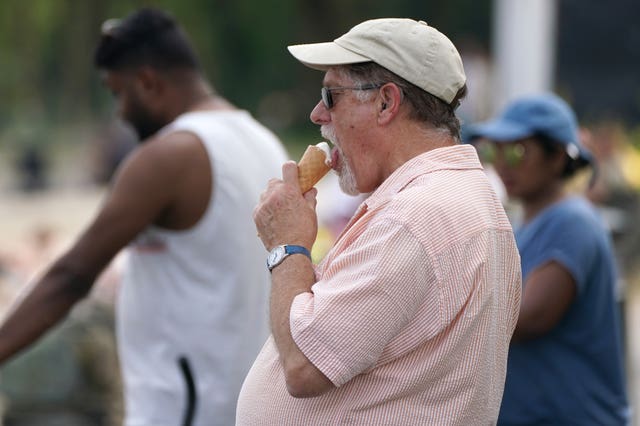Scotland has recorded its hottest day ever as temperatures climbed to 34.8C.
The temperature was recorded at Charterhall, in the Scottish Borders, according to provisional Met Office figures, and beat an almost 19-year-old record by 1.9C.
Since August 2003, Greycrook – also in the Scottish Borders – held the temperature record north of the border when it experienced a high of 32.9C.

Mark Wilson, of the Met Office, said Tuesday was “officially the highest temperature recorded in Scotland since records began”.
The Met Office has issued an amber weather warning – for extreme heat in eastern, southern and central parts of Scotland – which is in force until midnight on Tuesday.
And, at the same time, the forecaster has issued a yellow warning for thunderstorms for areas across north-east England and the Borders which is in place until 8pm.
🌡️ Charterhall in the Scottish Borders has provisionally set a new maximum temperature record for #Scotland today
📈 The temperature rose to 34.8°C earlier this afternoon, exceeding the previous record of 32.9°C recorded in Greycrook on 9th August 2003#heatwave #heatwave2022 pic.twitter.com/hZXMvOIRGA
— Met Office (@metoffice) July 19, 2022
Elsewhere in Scotland Eskdalemuir in Dumfries and Galloway recorded a temperature of 32.3C, while in Threave, Dumfries and Galloway, the thermometer climbed to 31.2C, the Met Office said earlier on Tuesday.
Heatwaves are being made more intense, frequent and longer by climate change, and scientists said it would be “virtually impossible” for the UK to have experienced temperatures reaching 40C without human-driven global warming.
The Met Office’s chief scientist Professor Stephen Belcher warned temperatures would get more extreme in the future, and the only way to stabilise the climate was to cut greenhouse gas emissions to net zero.
The rising temperatures have seen ScotRail put speed restrictions on many services, and rail bosses have warned trains could be delayed because of them.

And the Scottish Fire and Rescue Service (SFRS) has warned that the wildfire risk in southern and eastern parts of Scotland has risen to “very high”.
It said that, in prolonged periods of high temperatures, the risk of wildfires breaking out increases.
FRS deputy assistant chief officer Bruce Farquharson said: “At this time of year, the ground vegetation is a combination of green growth, with a relatively high moisture content, and dead vegetation lying on top, which can easily ignite and spread quickly over a large area.”
Meanwhile, south of the border temperatures topped 40C for the fist time, with 40.3C recorded at Coningsby, Lincolnshire.
The Met Office said at least 29 observation sites across England have provisionally broken the previous all-time record, from Bramham, in West Yorkshire, to Charlwood, in Surrey.




Why are you making commenting on The National only available to subscribers?
We know there are thousands of National readers who want to debate, argue and go back and forth in the comments section of our stories. We’ve got the most informed readers in Scotland, asking each other the big questions about the future of our country.
Unfortunately, though, these important debates are being spoiled by a vocal minority of trolls who aren’t really interested in the issues, try to derail the conversations, register under fake names, and post vile abuse.
So that’s why we’ve decided to make the ability to comment only available to our paying subscribers. That way, all the trolls who post abuse on our website will have to pay if they want to join the debate – and risk a permanent ban from the account that they subscribe with.
The conversation will go back to what it should be about – people who care passionately about the issues, but disagree constructively on what we should do about them. Let’s get that debate started!
Callum Baird, Editor of The National
Comments: Our rules
We want our comments to be a lively and valuable part of our community - a place where readers can debate and engage with the most important local issues. The ability to comment on our stories is a privilege, not a right, however, and that privilege may be withdrawn if it is abused or misused.
Please report any comments that break our rules.
Read the rules here